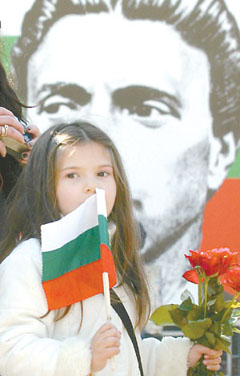Bulgaria has over 1300 years of history and treasures the names of many
heroes that contributed to Bulgaria's fame. Among them, one name is brighter
and more beloved than the rest-the name of "The Apostle of Freedom"-Vasil
Levski. There are many legends, along with great documentaries, that preserve
his revolutionary role in Bulgarian history. He is significant in the
liberation of Bulgaria to be hailed as a national hero and thus remembered
as "The Apostle of Freedom".
There were other attempts before him to liberate the country from the
Ottoman Empire, but Levski's revolutionary theory was the first to be
based entirely on full independence from any foreign powers. He also determined
the future form of government in liberated Bulgaria: a democratic republic,
standing on the principles of Human and Citizen Rights. The revolutionary
network created by him was ingenious, but a trader led Ottoman law enforcement
to capture Levski. He was convicted and hanged by the Ottoman authorities
in Sofia on February 19, 1873, a date somberly known as the saddest day
in our history. The revolutionary committees Levski set up paved the road
for the Russo-Turkish War in 1877-1878, which liberated Bulgaria from
the five centuries of Ottoman oppression.
Every year since Bulgaria's liberation, people bring flowers to Levski's
many monuments in Bulgaria and pay tribute in reverence to his life deed.
Now, the entire week of Feb. 19th is full of events dedicated to the Apostle:
exhibitions, reading meetings, as well as museum and community center
events. Schools named after Levski organize festivals and sporting events
also.
Vasil Levski, the Apostle, has been instated in the national historical
memory of the Bulgarians and is the only recipient of such deference.
By Daphne Karcheva-Orris

